

The Nvidia RTX 3090 (AKA ‘BFGPU’) is Nvidia's most powerful consumer graphics card (GPU). It’s a first-class monster of a GPU. It offers a whopping 10,496 Cuda Cores (Compute Unified Device Architecture). These Cuda Cores act in a similar way to that of a CPU, rocketing the GPUs processing abilities and knocking the socks off literally any other GPU out there. Another key feature of the 3090s computing power is 24GB of the world's fastest GDDR6X memory - memory that can process twice the amount of data in the same amount of time, as that of conventional GDDR6 memory.
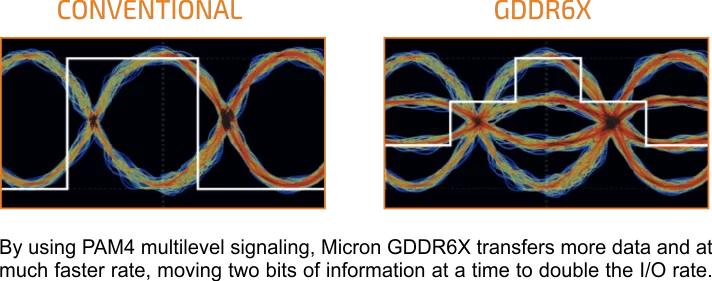
With the RTX 3090 retailing at just £1,500 it's a steal compared to the Titan, at £2,500... I say... I say - what?!
Along with the Nvidia RTX 3080 and the Nvidia RTX 3070 GPU, the RTX 3090 is the first in a series of graphics cards that utilises HDMI 2.1, ideal for 4K and a necessity for 8K gaming on the 3090. Given that these are Nvidia’s next-gen cards, the entire 3000 series GPUs are future proofed with PCIe 4.0, offering further speed benefits, providing your motherboard is PCIe 4.0 compliant, if not, however, fear not - the 3000 series are backward compatible and will work perfectly well on PCIe 3.0 motherboards too.
More information on PCI Express 4.0 motherboards.
The RTX 3090 GPU also supports the AV1 codec, which enables users to enjoy high resolution video streams using remarkably less bandwidth. The entire Nvidia RTX 3000 series also includes Nvidia Reflex, Nvidia Broadcast and Nvidia Studio.
Although Nvidia made no direct reference to the RTX 3090 being a direct replacement for the Titan RTX, it seems pretty obvious it is, as it has so much more to offer. The 3090 is fully capable of playing the latest games at 4 and 8K without batting an eyelid and although it boasts a 50% improved performance over the Titan… it’s not the type of card tailored towards gaming. The GPU was specifically designed and built to offer big improvements in rasterised and ray-traced 3D rendering, ideal for media creators rather than gamers. Both the RTX 3090 and the Titan have 24GB of memory, however, the 3090 utilises the newer GDDR6X memory, which far out performs the standard G6 memory offered by the latter.
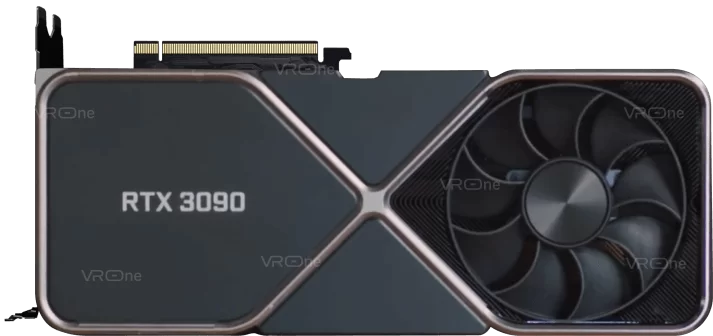
The other important performance factors between the RTX 3090 and the Titan include: Firstly, the amount of Cuda Cores - the Titan only providing 4,608, whereas the RTX 3090, which utilises Nvidia’s Ampere architecture has a massive 10,496. These Cuda Cores play an important role, in that they form the bulk of the GPUs processing power, essentially acting like a CPU. The card also delivers 2x the FP32 throughput over Turing and 36 shader-TFLOPS of processing power.
Nvidia claims that the RT Cores deliver 2x the throughput over Turing, plus concurrent ray tracing, shading, and compute, with 69 RT-TFLOPs of power. Secondly, the third generation Tensor Cores also have 2x the throughput of Turing, with 285 Tensor-TFLOPs of processing power. No way!... Way.
The final nail in the coffin for the Titan RTX is the price. At £2,500 you could almost buy two RTX 3090s for the cost of a single Titan… Now, you do the math.
Power Connections
The RTX 3090 - described by Nvidia’s CEO, Jensen Huang as the ‘BFGPU’ of all graphics cards. The 3090 is Nvidia’s most powerful, consumer GPU to date. The card measures 12.3” (313 mm) in length x 5.4” (138 mm), taking up 3 Slots. Although the card utilises a new 12-pin power connector, it does come with a ‘Y-split’ 2x 8-pin to 12-pin adapter. The RTX 3090 has a maximum power draw rating of 350W. It is PCI-Express 4.0 compliant (x16 interface). It’s display outputs include 3x DisplayPort and 1x HDMI 2.1. Within the 3000 series, the RTX 3090 is the only graphics card that supports SLI… however, unlike the Titan RTX the 3090 doesn't have a USB Type -C connection port.
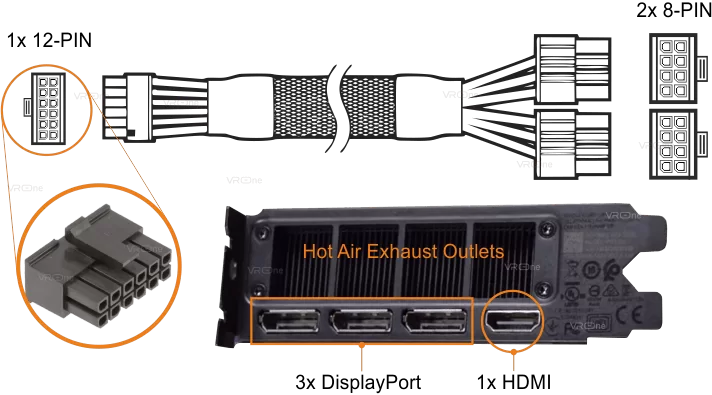
Cooling the Beast
The RTX 3090 is cool… quite literally! The 3090 GPU has a silencer, a 3 slot, dual axial flow through design, which keeps it 10x quieter, keeping the GPU 30 degrees cooler than its predecessor, the Titan RTX. Ampere’s cooling architecture consists of two fans which independently control and direct the airflow through the GPU. The fan at the bracket end of the card pulls cool air from the bottom and forces the hot air out through the graphics card bracket.
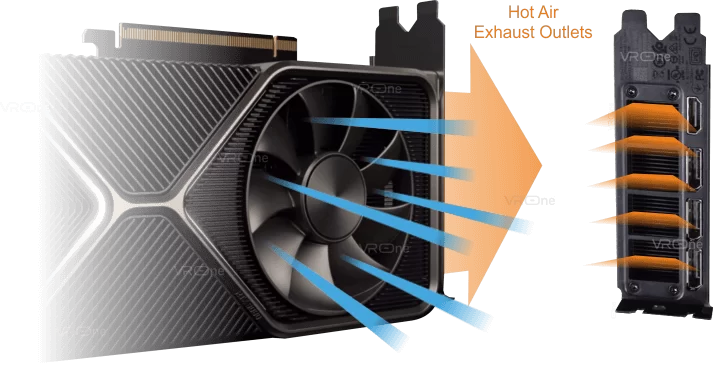
The second fan, genius by design, is on the opposite side and end of the card. This pull-through fan draws in cool air between the fins and around the heat pipes, dissipating the heat and directing the hot air to the top and back of the chassis to be exhausted by the PC system fans.
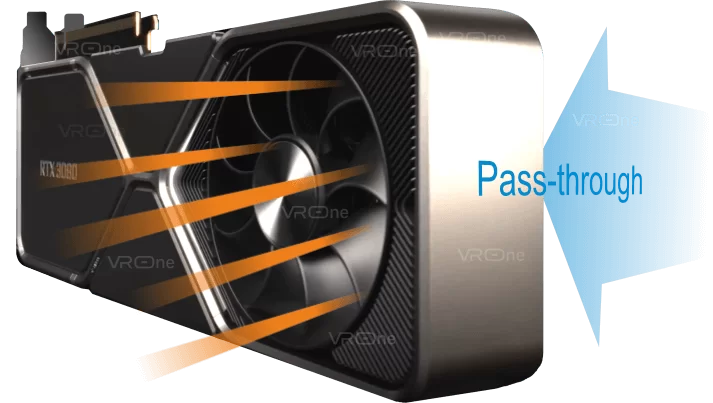
The ingenious part of the RTX 3000 cooling is down to the PCB. It’s 50% smaller than the previous generation circuit boards, allowing more room for air to pass through and around the various components.
BFGPU: Speed and Power
The 3090 boasts an incredible 10,496 Cuda Cores, which is essential because they provide the main bulk of the GPUs processing power. It also has 36 Shader-T-FLOPS, 69 RT-TFLOPS and has 285 Tensor-TFLOPS. The graphics card also utilises 24GB of Nvidia’s latest GDDR6X memory.
8K Gaming: Really!
The RXT allows you to play games at 60 frames per second (FPS) in 8K, however, in order to fully appreciate games that run at 8K, and there aren't many, you’ll need an 8K monitor or 8K TV - and they’re not cheap! If you’re really into high resolution displays and are thinking of taking the plunge, you may want to read the interview we had with Yusuf Al Hussaini, a tech student with a bachelor's degree in mathematics - Yusuf! “Do we need 8K?”
My thoughts on playing games at 8K, at 60 FPS, on ultra settings is less optimistic, certainly without the assistance of DLSS. Nvidia has already updated DLSS to version 2.1 (SDK - as I write) which is said to support ultra performance mode for 8K gaming and utilise up to 9x scaling. You may also be happy to know that DLSS 2.1 has been tweaked to better support future VR games on Ampere.
In my opinion 4K gaming is good enough for me. Do let me know your opinion on 8K gaming, as we’d love to hear what you have to say in the comments section below.
The chart below shows the side-by-side differences between the Nvidia RTX 3090 and the Titan RTX.
| Features | RTX 3090 | Titan RTX |
| Cuda Cores | 10496 | 4608 |
| Boost Clock | 1.7 GHz | 1.7 GHz |
| Memory Clock | 19.5 Gbps GDDR6X | 14 Gbps GDDR6 |
| Memory Bus Width | 384-bit | 384-bit |
| VRAM | 24 GB | 24 GB |
| Texture Rate | 556.0 GTexel/s | 509.8 GTexel/s |
| FP16 (half) performance | 35.58 TFLOPS (1:1) | 32.62 TFLOPS (2:1) |
| FP32 (float) performance | 35.58 TFLOPS | 16.31 TFLOPS |
| FP64 (double) performance | 1,112 GFLOPS (1:32) | 509.8 GFLOPS (1:32) |
| TDP | 350W | 280W |
| Suggested PSU | 750W | 600W |
| GPU | GA102 | TU102 |
| NVLink SLI | YES | YES |
| Bus Interface | PCIe 4.0 x16 | PCIe 3.0 x16 |
| HDMI | 2.1 | 2.0 |
| HDCP | 2.3 | 2.3 |
| Length | 12.3" | 10.5" |
| Width | 5.4" | 4.6" |
| Height | 3 Slots | 2 Slots |
| Transistor Count | 28 Million | 18.6 Million |
| Architecture | Ampere | Turing |
| Foundry (Man-Process) | Samsung 8nm | TSMC 12nm "FFN" |
| Launch Date | 24th Sept 2020 | 18th Dec 2018 |
| Launch Price | £1499 | £2500 |
| BUY RTX 3090 | BUY Titan RTX | |
Where can I buy the RTX 3090
The RTX 3090 doesn’t go on sale until September 24th 2020. You can’t even preorder the damn thing! The only option you have at present is to opt-in for a notification on Nvidia’s website and they'll notify you when it becomes available. The same applies on the Bestbuy website. If you’re seeking an aftermarket 3090, Overclockers UK offers an extensive range of triple-cooled variants, from the likes of Ausus, EVGA, Gigabyte, Inno3D, KFA2, MSI, Palit, PNY and Zotac. So keep in mind, if you can’t get hold of one of the Founders Edition cards from Nvidia, Overclockers UK is the place to go.
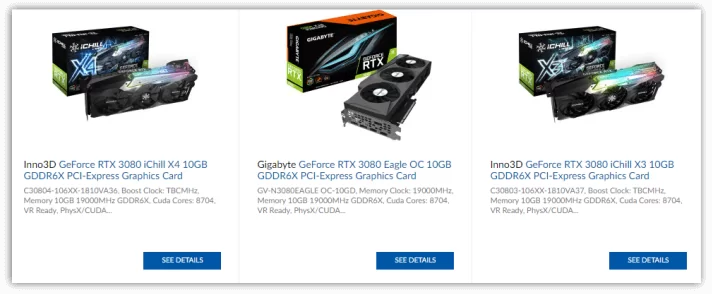
Conclusion
The RTX 3090 is certainly the card to go for if you do a lot of resource hungry work, such as rasterised and ray-traced 3D rendering. The RTX 3090 is a GPU more tailored towards media creators rather than gamers. From a memory perspective, the card does have a 15% performance gain on the RTX 3080, so, unless you’re CPU bound, you're still going to get more FPS than the 3080, however, I feel the little extra in FPS isn’t worth the extra £800, unlike the cost to performance ratio between the 3070 and the 3080, where the jump in performance is much more noticeable and justifiable.
What’s your opinion on the RTX 3090. Will it, or does it, live up to your expectations? Do let us know in the comments section below.
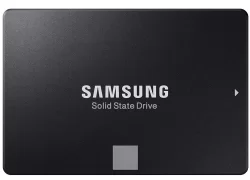



NVIDIA RTX 3090